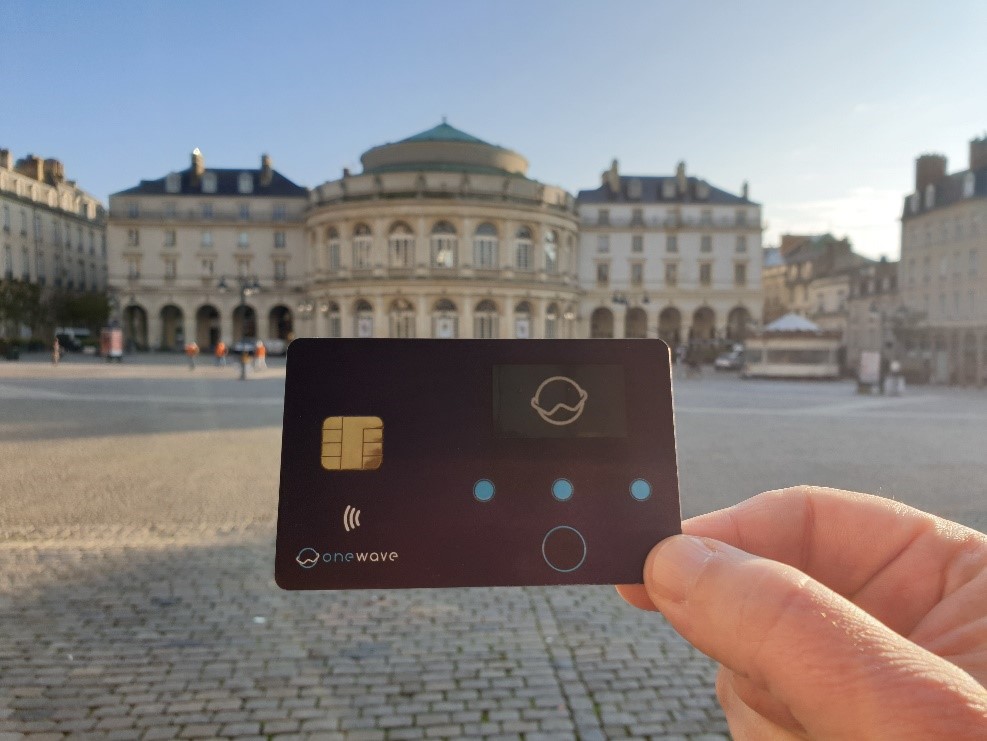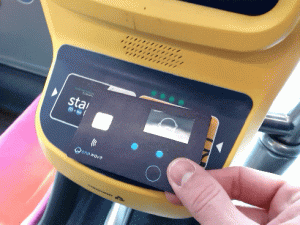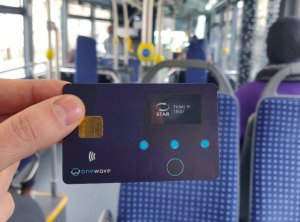
Supporting big ideas: how Calypso is helping OneWave with its ticketing smartcard journey
- By Chaix Manon
- In
Since it was founded in 2016, OneWave’s mission has been to develop a smartcard that combines innovation, functionality and security that can be used not just for ticketing, but for any professional or personal authentication need. I spoke to founder and CEO, Thomas Lechevallier to learn more about OneWave and how Calypso has supported its development journey...
Tell us a little about yourself and OneWave
OneWave was founded in 2016 in Rennes, France. Led by myself and my amazing team, we design and manufacture secure connected devices. Our ambition is to create an innovative, connected smartcard that provides convenience and security for all daily personal and professional needs, ranging from ticketing and payments to cyber-security access.
Today at OneWave, alongside leading our strategic and business development, I spend a lot of my time involved in product development and focusing on how we can continually refine the user experience with secure authentication.
What is unique about the OneWave card and how does it compare to other contactless ticketing solutions?
OneWave is an NFC-enabled connected smartcard that combines a flexible screen, Bluetooth connectivity and a fingerprint sensor. Its security architecture is built around a certified Secure Element. When combined, these elements provide high levels of security with a highly optimised user experience.
OneWave’s Bluetooth and NFC connections make it compatible with most of today’s smartphones, including iPhones, allowing users to manage the card through their connected consumer device.
On the card’s flexible screen, users can see important details such as available funds, remaining valid time and positive or negative validations.
How does it support an improved ticketing experience for passengers?
The OneWave card provides passengers with speed, convenience, and flexibility by enabling remote ticket management on their smartphone and removing the need to queue at vending machines and kiosks.
The addition of the flexible screen provides added flexibility and convenience for passengers as it means that rather than being rejected at the ticketing barrier because of an expired card or insufficient funds, they can quickly and easily see if their card is still valid or needs reloading.
OneWave has the versatility and reliability of many of today’s transit smartcards, but with all the benefits and features of a smartphone connection and a handy display screen. However, to keep it flexible, it also works just as well with users who haven’t connected it to a smartphone or even when the card’s power unit is flat.
How does it improve ticketing for transport operators (users) and municipal governments?
For operators and transport agencies, OneWave helps lower costs and reflects their willingness to embrace innovation to support their customers.
Using OneWave reduces the cost associated with providing kiosks and vending machines, freeing up valuable resources to support their passengers and infrastructure in other ways.
The use of open Calyspo specifications during its development helps bring further savings and benefits. Its compatibility with existing Calypso infrastructure provides seamless and cost-effective integration. Furthermore, fixing any issues or adding new services is done remotely, lowering operating costs further and making OneWave and Calypso a perfect ticketing partner for deploying new MaaS solutions.
By embracing a smart, innovative and unique ticketing solution that provides convenience and flexibility, operators will demonstrate their commitment to providing a system that aligns perfectly with their customers’ needs.
Did you encounter any challenges throughout the development process?
As with any hardware project, there are always challenges. Our earliest one was how we develop and integrate an innovative, smart ticketing solution despite the fact we were newcomers to the sector. This was a significant factor behind our decision to turn to Calypso, as it made our entry into the sector easier as we were working with an established, trusted, open technology backed up by a diverse, collaborative member community.
As our target transit network was a Calypso ticketing network, another major challenge arose when we realised that some parts of the intended hardware infrastructure were not using the latest specifications, which threatened to make overall compatibility an issue.
How did Calypso standards and the Eclipse Keyple tools support the development process and help you respond to these challenges?
Our Calypso membership gave us access to countless valuable resources that helped us quickly understand the specifications, smartcard integration and m-ticketing. CNA’s Applet and expert advisors ensured we quickly had a Calypso card compatible with the network we planned to launch with.
As Keyple is an open library of code specifically aimed at supporting developers make ticketing applications for Calypso infrastructure, it helped us build quick, effective, and inexpensive solutions. When we discovered that parts of the target network were not using the latest Calypso specifications with personalisation terminals used to associate cards with users, Keyple enabled us to develop our own compatible version in a single day.
Keyple also came to the rescue when the pandemic restrictions meant that our technical teams could not access a Keyple-based card wiper, but thanks to Keyple’s development capabilities, we were able to build our own compatible wiper ourselves.
What does the future hold for OneWave and what role do open ticketing standards have in supporting your long-term aspirations?
OneWave’s long-term ambition is to provide a single integrated device that combines and supports all our daily secure authentication needs. So far, CNA and the open standards have been essential. We realise that without them, OneWave’s development journey for transport ticketing would have been a much greater challenge. Going forward, they will continue to be a vital asset in helping us achieve this goal, empowering us to us innovate and integrate on our product journey, ultimately helping networks provide an enhanced experience for travellers.



